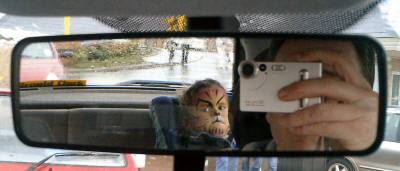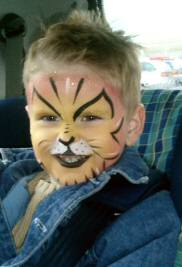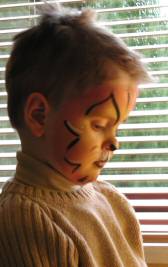The strangest thing happened yesterday: I took a little boy to the mall, and I came back with a little cat….
Newborn poo
I’d forgotten what the poo of a newborn, breastfed baby smells like. It’s sour and yeasty, and it triggers floods of memories. Every time I change Fiona’s nappy, I’m taken back to Alex’s early days, and I’m astonished at how much he has grown and changed in the last three years.
Alex is huge compared to Fiona. I can hold Fiona with one hand; that same hand can now no longer encircle Alex’s thigh. Alex talks. Not just words, but whole conversations. When we put him to bed, he wants to tell us about his day. When he comes through to our bed in the mornings, he wants to tell us what he’s going to do.
Right now they both have physical needs, but only Alex has emotional ones, even if he doesn’t properly understand them. He wants and needs our attention. He’s scared that we’re going to forget about him, and spend all our time on Fiona. He knows when we’re tired and stressed, and that makes him sad.
Although Fiona is the more helpless of the two, in many ways it’s more important for us to concentrate on Alex right now. Fiona needs warmth, soothing voices, a certain amount of visual stimulus, and mama milk. Alex needs intellectual and emotional effort. Fiona may be a challenge to Abi and me, but it’s Alex’s world that is experiencing the greatest upheaval right now. And he’s reacting in the only ways that he knows how: by getting angry, by getting sad and crying, by hitting us and screaming when we don’t immediately jump to attention.
It’s hard to react positively to that, and generally, we don’t. Letting him get away with behaviour that would be unacceptable under other circumstances is not the way to reassure him or make him feel loved. He has to figure out that the rules still apply: not just rules like “don’t use crayons on the walls”, but also the rule that “mom and dad love you no matter what else happens.”
It’s a tough balance. We want to spend the same kind of time and attention on Fiona that we did on Alex when he was young, but Alex’s presence means we can’t. It’s hard to put Fiona in second place mere days after her birth, and concentrate on Alex almost to the point of ignoring her, and it’s hard not to feel resentful towards Alex because of it. But I have to realise–and I have to help Alex realise–that this isn’t going to last forever.
We’ll find our new equilibrium sooner or later. In the meantime, Alex needs my patience and love more than ever.
Blood groups: gotta catch ’em all!
By interesting coincidence, we have bagged a full set of blood groups here in the Sutherland household. This makes us a nice little case study in genetics and blood typing.
| Abi | A- |
| Martin | B+ |
| Alex | AB+ |
| Fiona | O+ |
The simplest illustration of how genes pass from one generation to the next is the one we probably all learned in school: eye colour. If you have two copies of the “blue” gene, you have blue eyes. If you have two copies of the “brown” gene, you have brown eyes. Because the brown gene is dominant, a combination of blue and brown genes still results in brown eyes.
Unlike the blue/brown eyes gene, your ABO blood type is determined by a gene has three different forms: iA, iB and i. iA contains the code for making the “A” protein, iB generated the “B” protein, and the naked i doesn’t produce either one. You get one copy of this gene from each of your parents. Also unlike the blue/brown eyes gene, the iA and iB are co-dominant, which means that if you have copies of both of them, you end up producing both A and B proteins rather than just one of them.
People with A-type blood therefore have either two copies of iA, or one iA and a naked i. B-type blood is generated by two copies of iB, or one iB and a naked i. To have AB blood you must have both an iA and an iB, and to end up with O-type blood both of the genes have to be naked i, which results in a bloodstream devoid of both the A and B proteins.
The Rhesus (Rh) factor, which is the + or – after your blood type is much more like the blue/brown gene. The Rhesus gene has two forms, Rh+ and Rh-, of which the Rh+ form is dominant. So if you have one or more copies of Rh+, your genes will produce the Rh protein. If you have two copies of Rh-, they don’t.
These blood types are significant because of your body’s immune system. If you don’t already have a particular protein in your blood, your body will create an immune response to it if it is introduced. For example, if you are of blood type A, your body will generate antibodies to attack the B protein. If the B protein is pumped into your body in large enough quantities, say in a blood transfusion, the clumping and clotting produced by the antibody response may actually kill you.
People with the blood type AB+ are really lucky: they have all of the relevant proteins coursing through their systems already, and can accept transfusions of any type of blood. They are called universal recipients. Conversely, though, the blood they donate can only be used by other AB plussers, which means they are of limited use as donors.
People with O- blood have none of the proteins present. This means that any blood type other than O- will generate a dangerous immune response. That sucks. On the other hand, because their blood has no proteins to cause a reaction, their blood can be used by anyone else. O- people are called universal donors. Blood banks love O negs.
Alex, therefore, is a universal recipient. Good for him, because even at this early age he’s a thrill-seeker, and he’s probably destined for fame, glory, and broken bones galore in some outlandish extreme sport. Fiona, on the other hand, is going to have to be more careful when she goes para-base-boarding (or whatever). Fiona can donate to Alex, but Alex can’t donate to Fiona.
Their blood types also tell us that Abi must have only one copy of the iA gene, and that I have only one copy of iB. Abi is Rh-negative, so she has two copies of the Rh- gene. Alex and Fiona therefore both have one copy of the Rh- gene. Because they are both Rh+, though, they must have both received their other Rh+ gene from me. Without checking with my parents and my brother (and possibly even further back along the family tree), I don’t know if I have two copies of Rh+, or just one.
So out of the four of us, we can nail down the blood-typing gene patterns for three of us with certainty:
| Abi | iA/i and Rh-/Rh- |
| Martin | iB/i and Rh+/Rh?? |
| Alex | iA/iB and Rh+/Rh- |
| Fiona | i/i and Rh+/Rh- |
I think that’s pretty cool.


